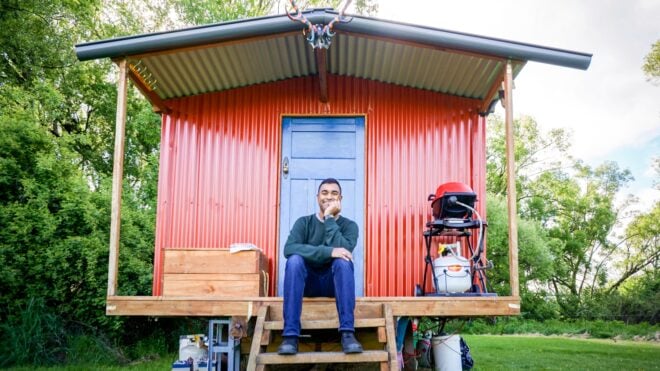I had a lump in my throat watching President Obama deliver his speech about taking executive action on immigration reform. I have been hopeful, waiting, for Congress to pass immigration reform over the last few years, but I've grown impatient with the infighting, the politics and the lack of action — one way or the other — to make changes; to have a definitive answer. I never expected to be fully satisfied with the option they'd hammer out, but I did expect something, and I've been disappointed, perhaps, for expecting too much from our elected officials.
This is where we get stuck — in Congress and in general: Critics of immigration reform are concerned with many things. Amnesty, border security, whether reform can or should provide a path to citizenship, unemployment and immigrants taking jobs from Americans, immigrants taxing the social services system, immigrants paying taxes, language barriers, and whether immigrant parents of U.S. born children should be allowed to stay, just to name a few. Many of these concerns, some more legitimate than others, have been addressed or dispelled. However, there is no perfect solution to please everyone. Lack of compromise and acting like toddlers rather than elected officials has caused President Obama to take executive action.
Having personally experienced going through our broken immigration system, I have complex feelings about immigration as a whole.
This executive action focuses on deporting "felons, not families" and "criminals, not children," as the President said in his address. It aims to build on progress made with border security in order to help reduce illegal crossings (which are currently at the lowest rate since the 1970s), and to make it easier and more efficient for highly-skilled graduates and entrepreneurs to stay here, or come here, and contribute to our country. Those are good things, in my book.
But having personally experienced going through our broken immigration system, I have complex feelings about immigration as a whole. Of course, I want the system to be fixed (even though what happens will not directly affect me), but there's more to it than that.
Many of the people who come to the U.S. without the necessary documents to legally stay are doing so because they want a better life for themselves and their children. Who can't identify with wanting the best for their kids? Take into account children who may have been brought to the U.S. by their parents and have to live in the shadows because of a decision they didn't make for themselves, and you've got a very complex issue. There are many facets to the immigration debate, and none of them are easy issues to solve.
Having been through the immigration process with my husband, who was born a Mexican citizen — and following the letter of the law every step of the way — it still was an onerous and expensive process. We were privileged enough to be shepherded through the process by an excellent attorney. But many people who come here legally and are eligible for legal permanent residency, and then citizenship, still find it tough to navigate the process and pay the filing fees, let alone afford attorney fees, when they may already be just scraping by. Not everyone who comes here legally will have it as "easy" as we did.
Going through the immigration process gives one more compassion for others who will struggle through the process.
Aside from the financial hurdles, it's a stressful process where your marriage and family life is reduced to a pile of bona fides such as joint bank statements, income tax returns, property ownership or rental documents, your kids' birth certificates and so on. They tell you to bring family photos to your immigration interviews as well, but in my personal experience, all we were ever asked for were the financial and legal documents that bound us together on paper as a family.
It is, at times, a dehumanizing, sterilized experience that makes you feel like little more than a stack of papers qualifying your existence… and that's from the perspective of someone who understood everything going on, was prepared, had no language barriers and had the resources for filing fees and attorneys to advocate on her family's behalf. Before going through the process myself, it was more black and white, more right-side and wrong-side. But when the shoe was on the other foot, it truthfully became more a shades-of-gray situation. Going through the immigration process gives one more compassion for others who will struggle through the process.
One day, I will show my children a video of the day their dad became a U.S. citizen, so he could be afforded the same rights and privileges that they will be born with.
It was important to me that my husband become a U.S. citizen before we started a family — not only for the peace of mind it would bring me — but also because he was afforded the privilege to become a citizen, and that is a privilege not to be wasted when there are so many who yearn to have the same opportunity but cannot make it a reality. One day, I will show my children a video of the day their dad became a U.S. citizen, so he could be afforded the same rights and privileges that they will be born with.
Having been through it, it's easy to understand why some people have lived in the shadows for many years, especially when there can be so much at stake with kids involved, but that's not to say that leading an undocumented life is the answer when the process is difficult, either. This executive action addresses the issue that these people are here, they exist, and we need to do something about it instead of just complaining or deporting everyone. As Obama said: "tracking down, rounding up and deporting millions of people" is simply an unrealistic solution.
To be sure, this executive action makes it possible to "get right with the law," but it does not make it easy. The undocumented aren't being given amnesty, they still face many hurdles — financially and otherwise — and they must meet a list of requirements to even be eligible to delay potential deportation proceedings. They are not being given a path to citizenship. But they are being given an opportunity to be held accountable and step out of the shadows.
President Obama struck a chord with me in the last moments of his speech. He said:
We were strangers once, too. My fellow Americans, we are, and always will be, a nation of immigrants. We were strangers once, too. And whether our fore bearers were strangers who crossed the Atlantic, or the Pacific, or the Rio Grande, we are here only because this country welcomed them in and taught them that to be an American is about something more than what we look like, or what our last names are, or how we worship. What makes us Americans is our shared commitment to an ideal that all of us are created equal and all of us have the chance to make of our lives what we will. That's the country our parents and grandparents and generations before them built for us. That's the tradition we must uphold. That's the legacy we must leave for those who are yet to come.
Before you decide whether executive action is right or wrong, part of the solution or part of the problem, fair or not, I urge you to watch the president's immigration action address and know the facts on what this executive action means.
Almost all of us are here, as Americans, because someone who came before us took the risk to seek out a better life for themselves, their children and future generations of their family. Is that not something we can all identify with? Perhaps we could afford to gain a little perspective from considering how we sometimes take for granted what others are willing to sacrifice everything to obtain.





